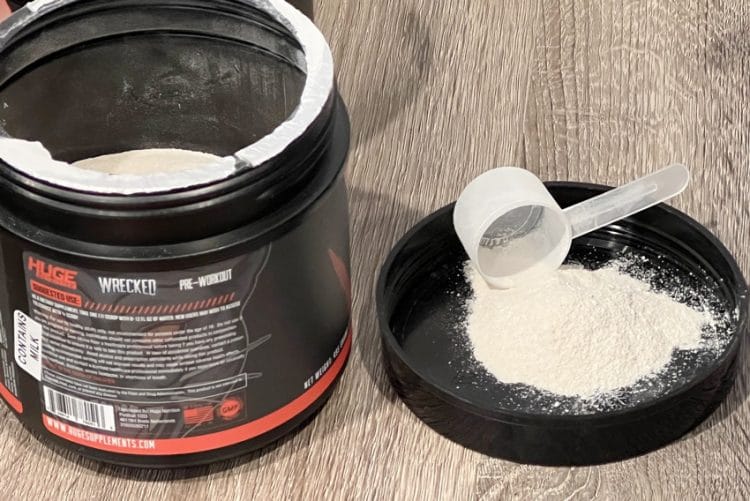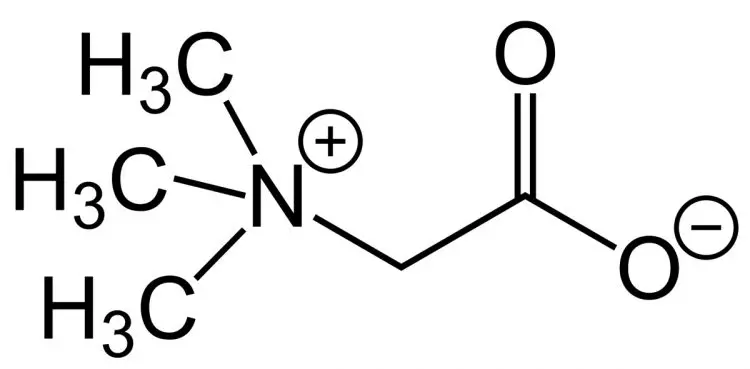What is Pre-Workout?
Pre-workout is a dietary supplement that is consumed before engaging in exercise. Pre-workout contains various ingredients that provide energy, increase endurance, and improve performance [1, 2, 3, 4].
Pre-workout supplements are typically powders that you mix with water and drink. Pre-workout is designed to be consumed between 15 and 30 minutes before beginning a workout for the best results and can also be drunk during exercise [1]. Each pre-workout product may have various “suggested use” guidelines.

Ingredients in Pre-Workout
To evaluate if drinking a pre-workout could break your fast, we need to look at the most common ingredients in pre-workout supplements.
Beta-alanine
Beta-alanine is an amino acid found in meat, poultry, and fish [1]. It can also be synthesized by the liver [1]. Studies show that beta-alanine can improve exercise performance (especially during high-intensity exercise), reduce neuromuscular fatigue, shorten recovery time, and increase muscle mass [1, 2, 3, 4, 11].
Caffeine
Caffeine is usually the primary ingredient in pre-workout supplements [1, 2, 3]. It is a stimulant that improves alertness, improves neuromuscular function, increases the release of endorphins, and even inhibits the perception of pain [1, 11]. These improvements increase athletic performance, endurance, power, and concentration [1, 2, 3].
Level Up Your Fitness: Join our 💪 strong community in Fitness Volt Newsletter. Get daily inspiration, expert-backed workouts, nutrition tips, the latest in strength sports, and the support you need to reach your goals. Subscribe for free!
Creatine
Creatine is an amino acid that is found in red meats and seafood, and it can also be synthesized in the body [1, 3]. The body stores creatine in skeletal muscle [1]. When exercising, the body utilizes stored creatine to produce ATP, which provides energy for muscles [1, 2]. ATP also aids in improving strength, power, performance, speed, and recovery [1, 2, 3].
Taurine
Taurine is naturally found in animal proteins [4]. It plays a role in glucose regulation and improves metabolism, while it also has antioxidant and anti-inflammatory properties [3, 4]. Studies show that it may improve muscular endurance, increase muscle force, delay muscle soreness, and improve performance outcomes [3, 4].
Branch-Chain Amino Acids
Branch-chain amino acids (BCAAs) contain three essential amino acids, leucine, isoleucine, and valine [5]. Consuming BCAAs pre-workout increases protein synthesis, limiting protein breakdown and reducing muscle damage during exercise [3, 5, 11]. This aids in improved recovery and reduces muscle soreness post-exercise [3, 5].
Betaine
Betaine is a derivative of glycine, an amino acid, that is found in foods such as whole grains, spinach, and beets [3, 6]. Research shows that betaine may improve body composition, muscle size, and muscle power and force as it can increase creatine synthesis and elevates nitric oxide levels in the blood, which improves blood flow and exercise performance [3, 6].
L-arginine
L-arginine is a non-essential amino acid that can be consumed through protein sources and synthesized in the small intestine [7]. L-arginine also assists in synthesizing nitric oxide, like betaine [3, 7]. It improves athletic performance, endurance, and promotes cell growth, and regulate4s the mobilization of fuel to increase muscle mass [7].
L-Citrulline
L-citrulline is a non-essentail amino acid. Studies have found that l-citrulline improves exercise performance and recovery [3, 8].
L-theanine
L-theanine is primarily found in a tea plant called camellia sinensis [2]. It aids in improving focus and cognition [2, 9]. Studies have found that when l-theanine is combined with caffeine, it helps further increase focus and performance accuracy [2, 9].
L-carnitine
L-carnitine is an amino acid that can be synthesized in the kidneys, liver, and brain, and it can be consumed through aminal proteins [10]. It can increase protein synthesis during exercise, prevent muscle loss, increase alertness, and improves recovery [2, 10].
Level Up Your Fitness: Join our 💪 strong community in Fitness Volt Newsletter. Get daily inspiration, expert-backed workouts, nutrition tips, the latest in strength sports, and the support you need to reach your goals. Subscribe for free!
Sugar or Artificial Sweeteners
Most pre-workout supplements contain sugar, sugar alcohols, or artificial sweeteners. They are used to make the drink more palatable and easier to drink.
Does Pre-Workout Break Your Fast?
Fasting Rules and Guidelines
Fasting generally involves fasting from food and drinks for a specified duration in time in order to gain the benefits of fasting. Some fasting diets allow you to consume some food while others are completely restrictive. When fasting, you are usually only allowed to drink water or other zero-calorie beverages, such as tea or black coffee.
Fasting Diet Guidelines:
- 16:8 Intermittent Fasting – You are not allowed to eat or drink anything with calories during the 16-hour fasting period.
- 20:4 Intermittent Fasting – You are not allowed to eat or drink anything with calories during the 20-hour fasting period.
- Alternate Day Fasting – You are allowed to eat up to 25% of your daily caloric intake on fasting days.
- 5:2 Fasting – You are allowed to eat approximately 400-500 calories on fasting days.
- Periodic Fasting – You are not allowed to eat or drink with calories for the 24-hour fasting period.
The goal of fasting is to keep your body in a fasted state. When your body is in a fasting state, your body switches where it draws its source of fuel from [13]. When you eat three or more meals a day, your body utilizes glucose for energy [13]. But, when your body is in a fasting state, your body uses fatty acids for energy [13].
When fatty acids are used for energy, insulin levels drop because it is no longer needed to convert glucose to energy [13]. When your fast is disrupted, your insulin levels will rise again.
Drinking Pre-Workout While Fasting
Whether drinking pre-workout breaks your fast or not highly depends on the ingredients in the pre-workout.
The main ingredients you need to look out for in pre-workout supplements are sugar, sugar alcohols, and artificial sweeteners. While pure sugar will break your fast due to calories, any form of artificial sugar or sweetener will break your fast because they cause a spike in insulin [14, 15]. Some pre-workouts also contain carbohydrates or flavoring, which can also break your fast.
Amino acids may cause your body to end its fasting state. Research shows that BCAAs are known to increase insulin levels [16]. Other amino acids are said to have the same effect as BCAAs. However, there is a limited amount of scientific evidence to conclude whether or not other amino acids will break your fast.
The only two ingredients that research shows will not break your fast are caffeine and creatine. Caffeine does increase insulin levels and contains less than five calories per serving [17]. Creatine also does not affect insulin [18].
Some fasting diets, such as alternate-day fasting and 5:2 fasting, allow for some caloric intake during the fasting period. Based on the guidelines for those fasting diets, drinking a pre-workout supplement will not technically break your fast. However, fasting diets such as 16:8 intermittent fasting, 20:4 intermittent fasting, and periodic fasting guidelines restrict all food and calorie-containing beverages.
Based on this information, some pre-workout supplements may not break your fast, but others might.
If you want to take a pre-workout while fasting, it would be best to pick one without any added carbohydrates, sugars, or BCAAs. Or, you may plan to take your pre-workout with your last meal before you begin your fast and exercise before your body enters a fasting state.
Another alternative, if you are looking for a pre-workout energy boost and do not want to risk throwing your body out of a fasting state, is to drink a cup of black coffee. Black coffee will provide the energy boost you need and improve performance, endurance, and concentration [1, 2, 3].
Learn everything about intermittent fasting
- How Long Until Intermittent Fasting Works? A Realistic Timeline for Results
- When Does Your Body Start Burning Fat with Intermittent Fasting?
- 14/10 Intermittent Fasting: The Simple Hack for Better Health and Weight Loss
- The Ultimate Guide to Alternate-Day Fasting: Boost Metabolism, Lose Weight, & Feel Great
- Intermittent Fasting and Exercise: Should You Work Out on an Empty Stomach?
- 6 Surprising Facts About Meal Timing and Metabolism
- Forget Eating Before Workouts — Do Fasted Training for Increased Fat Oxidation
- Is Intermittent Fasting Safe for You? Here’s What the Experts Say
- Is Fasted Cardio in the Morning Effective? Here’s What the Experts Say
- What Are the Long-Term Effects of Intermittent Fasting? Here’s What the Experts Say
- How Much Fasting Is Too Much?
- The Role of Fasting in Bodybuilding: Benefits and Drawbacks
- 7 Nutritionist Approved Intermittent Fasting Plans for Beginners You’ll Wish You’d Known About Sooner
- 6 Nutritionist Approved Meal Ideas for Breaking Your Intermittent Fast You’ll Wish You’d Known About Sooner
- Benefits of a 72 Hour Fast: Unlock Cellular Repair, Weight Loss, and Lower Blood Sugar Levels
FAQs
Can you take a pre-workout when fasting?
Depending on the fasting diet and the ingredients in the pre-workout, you may be able to take pre-workout while fasting. Some ingredients in pre-workout can throw your body out of a fasting state.
What pre-workout will not break your fast?
Pre-workout that contains zero calories, caffeine, and creatine will not break your fast.
Will 10 calories break a fast?
While some pre-workout supplements only contain a few calories, any calories consumed can break a fast unless the fasting diet you are following allows some calorie consumption.
Does pre-workout spike insulin?
Yes, the carbohydrates and BCAAs in pre-workout supplements are known to spike insulin.
Wrapping Up
Overall, pre-workout may break your fast. A pre-workout breaking your fast depends on the guidelines of the fasting diet you are following and the ingredients in the pre-workout.
Whether or not you are looking at pre-workout ingredients to determine if they will break your fast or not, it is always a good idea to research the effects of ingredients. The ingredients in pre-workout dietary supplements are not reviewed by the USDA for safety or effectiveness [1].
References
- Harvard Health. (2022, April 27). Workout Supplements. The Nutrition Source. https://www.hsph.harvard.edu
- Ellerbroek, A., & Antonio, J. (2019). Effects of Pre-Workout Supplements on Strength, Endurance, and Mood. Internet Journal of Allied Health Sciences and Practice. https://doi.org/10.46743/1540-580x/2019.1764
- Harty, P. S., Zabriskie, H. A., Erickson, J. L., Molling, P. E., Kerksick, C. M., & Jagim, A. R. (2018). Multi-ingredient pre-workout supplements, safety implications, and performance outcomes: a brief review. Journal of the International Society of Sports Nutrition, 15(1). https://doi.org/10.1186/s12970-018-0247-6
- Kurtz, J. A., VanDusseldorp, T. A., Doyle, J. A., & Otis, J. S. (2021). Taurine in sports and exercise. Journal of the International Society of Sports Nutrition, 18(1). https://doi.org/10.1186/s12970-021-00438-0
- VanDusseldorp, T., Escobar, K., Johnson, K., Stratton, M., Moriarty, T., Cole, N., McCormick, J., Kerksick, C., Vaughan, R., Dokladny, K., Kravitz, L., & Mermier, C. (2018). Effect of Branched-Chain Amino Acid Supplementation on Recovery Following Acute Eccentric Exercise. Nutrients, 10(10), 1389.
- Cholewa, J. M., Wyszczelska-Rokiel, M., Glowacki, R., Jakubowski, H., Matthews, T., Wood, R., Craig, S. A., & Paolone, V. (2013). Effects of betaine on body composition, performance, and homocysteine thiolactone. Journal of the International Society of Sports Nutrition, 10(1). https://doi.org/10.1186/1550-2783-10-39
- Viribay, A., Burgos, J., Fernández-Landa, J., Seco-Calvo, J., & Mielgo-Ayuso, J. (2020). Effects of Arginine Supplementation on Athletic Performance Based on Energy Metabolism: A Systematic Review and Meta-Analysis. Nutrients, 12(5), 1300. https://doi.org/10.3390/nu12051300
- Gonzalez, A. M., & Trexler, E. T. (2020). Effects of Citrulline Supplementation on Exercise Performance in Humans: A Review of the Current Literature. Journal of Strength and Conditioning Research, 34(5), 1480–1495.
- Giesbrecht, T., Rycroft, J., Rowson, M., & de Bruin, E. (2010). The combination of L-theanine and caffeine improves cognitive performance and increases subjective alertness. Nutritional Neuroscience, 13(6), 283–290.
- Fielding, R., Riede, L., Lugo, J., & Bellamine, A. (2018). l-Carnitine Supplementation in Recovery after Exercise. Nutrients, 10(3), 349. https://doi.org/10.3390/nu10030349
- Spradley, B. D., Crowley, K. R., Tai, C. Y., Kendall, K. L., Fukuda, D. H., Esposito, E. N., Moon, S. E., & Moon, J. R. (2012). Ingesting a pre-workout supplement containing caffeine, B-vitamins, amino acids, creatine, and beta-alanine before exercise delays fatigue while improving reaction time and muscular endurance. Nutrition & Metabolism, 9(1). https://doi.org/10.1186/1743-7075-9-28
- Davis, G. R., & Nelson, A. G. (2021). Niacin supplementation impairs exercise performance. International Journal for Vitamin and Nutrition Research. https://doi.org/10.1024/0300-9831/a000736
- Stockman, M. C., Thomas, D., Burke, J., & Apovian, C. M. (2018). Intermittent Fasting: Is the Wait Worth the Weight? Current Obesity Reports, 7(2), 172–185. https://doi.org/10.1007/s13679-018-0308-9
- Nagpure, S., Mathur, K., Agrawal, R., & Deshpande, D. (2020). Effect of artificial sweeteners on insulin resistance among type-2 diabetes mellitus patients. Journal of Family Medicine and Primary Care, 9(1), 69. https://doi.org/10.4103/jfmpc.jfmpc_329_19
- Macdonald, I. A. (2016). A review of recent evidence relating to sugars, insulin resistance and diabetes. European Journal of Nutrition, 55(S2), 17–23. https://doi.org/10.1007/s00394-016-1340-8
- Zhang, Y., Kobayashi, H., Mawatari, K., Sato, J., Bajotto, G., Kitaura, Y., & Shimomura, Y. (2011). Effects of Branched-Chain Amino Acid Supplementation on Plasma Concentrations of Free Amino Acids, Insulin, and Energy Substrates in Young Men. Journal of Nutritional Science and Vitaminology, 57(1), 114–117. https://doi.org/10.3177/jnsv.57.114
- Moon, S. M., Joo, M. J., Lee, Y. S., & Kim, M. G. (2021). Effects of Coffee Consumption on Insulin Resistance and Sensitivity: A Meta-Analysis. Nutrients, 13(11), 3976.
- Gualano, B., Novaes, R. B., Artioli, G. G., Freire, T. O., Coelho, D. F., Scagliusi, F. B., Rogeri, P. S., Roschel, H., Ugrinowitsch, C., & Lancha, A. H. (2007). Effects of creatine supplementation on glucose tolerance and insulin sensitivity in sedentary healthy males undergoing aerobic training. Amino Acids, 34(2). https://doi.org/10.1007/s00726-007-0508-1














